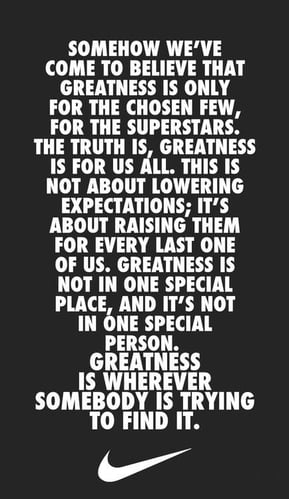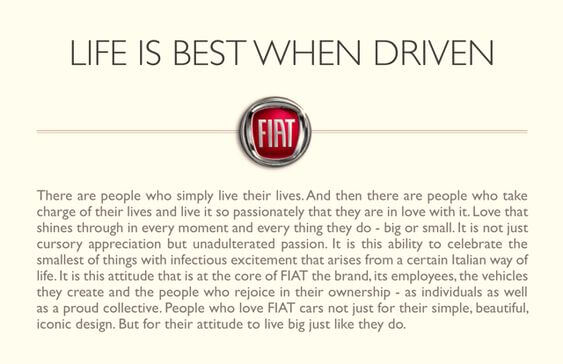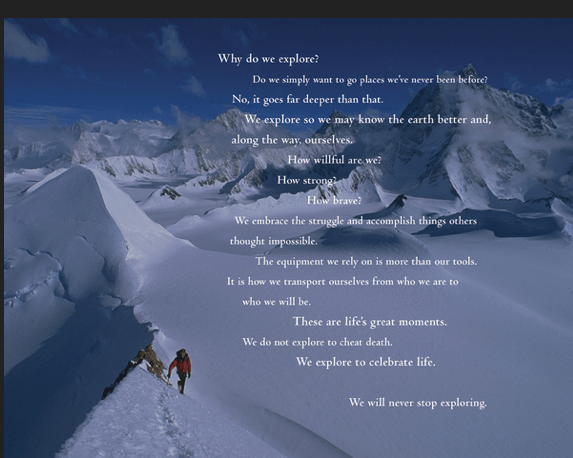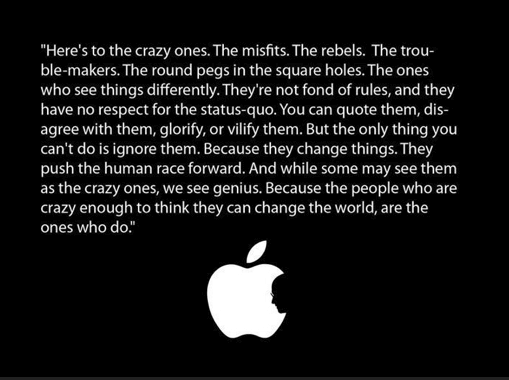In Simon Sinek’s famous Ted Talk “How great leaders inspire action”, he fleshes out a concept that some of the most inspiring leaders and organizations -- specifically Apple, Martin Luther King Jr., and the Wright Brothers -- leveraged to build loyal followings. It’s called Start With Why.
Start With Why suggests that if your brand truly wants to inspire an audience to follow you, your core message should focus on your organization’s purpose -- not how you make your product or what your product is. Spotlighting why people should care about your organization is how Apple, Martin Luther King Jr., and the Wright Brothers ultimately built a body of support for their causes, even though they all faced fierce competitors.
Simon Sinek’s notion that people buy the “why” behind your organization, not the “what” or “how”, isn’t some idealistic trend catching fire in the business world today. It’s actually rooted in human biology. To explain further, the most primal part of the brain is called the limbic system, and it controls all decision making. It also happens to control all of our emotions and feelings.
So, resonating with your audience will also appeal to the part of the brain that’s responsible for action. In other words, if you can evoke emotion, you can drive behavior. If you can’t do the former, though, you’ll struggle to build a loyal following, let alone sell them anything.
But how do you discover the “why” behind your organization? How do you actually connect with an audience and inspire them to follow you? One of the best places to start is by writing a brand manifesto.
What is a brand manifesto?
A brand manifesto describes why your organization exists, its purpose, and why people should care about your brand. It’s typically an emotional story that captivates your audience, emotionally connects with them, and persuades them to support your brand. Not only can it build a loyal customer base, but it can also attract top talent to your organization.
5 of the Best Brand Manifesto Examples
1. Nike

Image Credit: Pinterest
Even though Nike endorses some of the biggest names in sports, like LeBron James, Cristiano Ronaldo, and Serena Williams, they never boast about how the best athletes in the world use their equipment. Instead, they stick to what has skyrocketed them to the top of the sports equipment industry -- emotional resonance.
Nike wants people to understand that success doesn’t mean becoming the greatest of all time. It means you did everything you could to become the best possible version of yourself. And that’s the “why” behind their brand -- to empower every athlete, regardless of their talent or ability, to reach their potential and achieve their own greatness.
2. Fiat

Image Credit: Pinterest
Fiat isn’t just selling a sleek, Italian car. They’re selling a lifestyle. In their brand manifesto, you get a glimpse of the life they want to offer to their customers -- a life that they can live with burning passion and thrilling excitement.
However, Fiat doesn’t want its customers to live recklessly. They actually want them to treasure the little things in life just as much as the big things. So the “why” behind Fiat’s brand isn’t really changing their customers’ lifestyle -- it’s changing their attitude toward life. And that’s a compelling mission to have.
3. The North Face

Image Credit: Pinterest
Most travel equipment brands focus on how their products can enable you to travel and explore your surroundings, which is engaging on the surface. But, in The North Face’s brand manifesto, they go another layer deeper by diving into why we explore.
By describing how exploring helps us understand ourselves better, The North Face’s purpose is crystal clear -- they not only want to help us explore more, but they also want to help us change for the better, lead more fulfilling lives, and cherish what we have.
4. Apple

Image Credit: Pinterest
For almost his entire career, Steve Jobs was considered crazy. His bitter disdain for the status quo compelled him to shatter conventional wisdom whenever he could, driving such a large wedge between him and his colleagues that they forced him out of the company he founded.
Despite all his controversy, though, Steve Jobs’ ability to think differently was what fueled Apple’s innovation and transformed it into the most valuable brand in the world. Steve Jobs’ story is the driving force behind Apple’s purpose. If they can inspire people to think differently and challenge the status quo, then they can help propel society forward and change the world -- just like Steve Jobs did.
5. Levi’s

Image Credit: Pinterest
No one wants to coast through life. But, a lot of times, we drift away -- and we don’t even notice it happening. To help catch yourself settling in life before it’s too late, Levi’s crafted a brand manifesto overflowing with so much purpose that it could convince Eeoyre from Winnie-the-Pooh to go make his mark on the world.
By asking their audience whether they’ve made the world any better and telling them that all they need is their gut instinct and the clothes on their back to make that impact, Levi's conveys a brand purpose almost everyone would passionately follow for the rest of their lives -- don’t ever settle.
How to Write a Brand Manifesto
- Identify your organization's "why".
- Write in second- or third-person to place your audience into the story you're telling.
- Describe how your brand's purpose will improve people's lives.
1. Identify your organization’s "why”.
Your brand’s purpose drives your entire brand manifesto. Without presenting a clear and convincing purpose, your manifesto will seem like an inauthentic, emotionally manipulative sales pitch. Your audience wants to know why they should care about you -- and your product’s “best-in-class” features has never been a compelling enough reason to support a business.
To uncover your organization’s "why”, consider asking your founders why they started the company. What problem were they trying to solve? Why did it bug them so much? And why do they want to keep growing the company? You’ll most likely find your organization’s purpose within those answers.
2. Write in second- or third-person to place your audience into the story you’re telling.
In each of the brand manifestos above, you’ll notice that the copy pulls you in by including the words "we” or "people”. That’s because Nike, Fiat, and The North Face all know that their audience primarily cares about how the brands can help them, so using pronouns like "you”, "we", and "them” (when referring to their own customer base) can engage people on a personal level and place them in the narrative the brands are crafting.
3. Describe how your brand’s purpose will improve people’s lives.
Most people aspire to transcend their current identity and lives. Self-actualization is a universal goal that almost everyone wants to achieve. And the smartest brand marketers understand this about the human condition.
For instance, did you notice how each of the brand manifestos above is essentially a life mantra that can improve your life? Nike -- define and meet your own greatness. Fiat -- enjoy life to the fullest. The North Face -- never stop exploring. Apple -- think differently and challenge the status quo. Levi’s -- don't ever settle in life.
By describing each brand's purpose in a such genuinely selfless fashion, each company's brand manifesto can prompt their audience to imagine a future with their product or service bettering their lives.
Start With Why
Your brand’s purpose is one of the most challenging things to pinpoint and communicate. But if you want to craft a compelling brand manifesto that will engage an audience and persuade them to support your brand, you must be able to clearly convey the reason you exist and why anyone should care. Only then will you be able to build the loyal following that every brand craves.
No comments:
Post a Comment